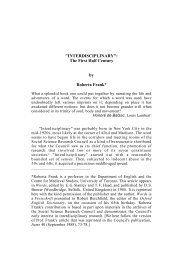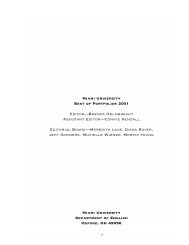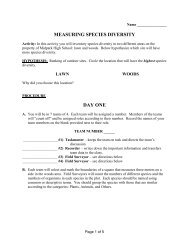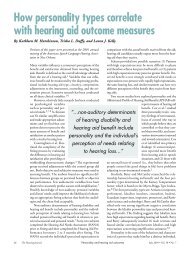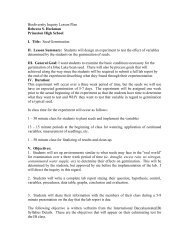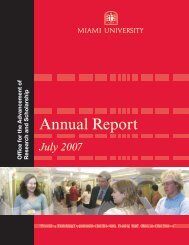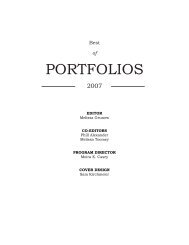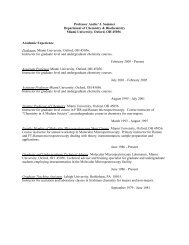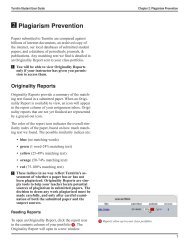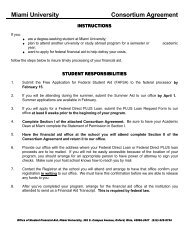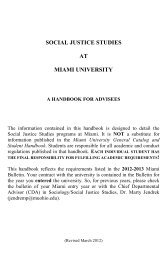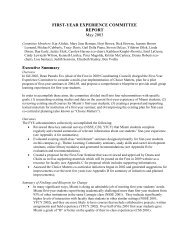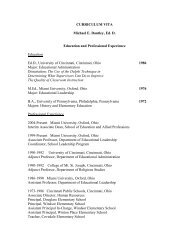Interdisciplinary Research Manual - Units.muohio.edu
Interdisciplinary Research Manual - Units.muohio.edu
Interdisciplinary Research Manual - Units.muohio.edu
Create successful ePaper yourself
Turn your PDF publications into a flip-book with our unique Google optimized e-Paper software.
21<br />
established. So proudly quote the email reply you got from the head of the group you are<br />
studying to illustrate how they think about a policy whose existence you have established<br />
using evidence in published sources.<br />
The Literature Review<br />
The Task. In a nutshell, your literature review should explore broad topic areas of<br />
your project that were ideally (but not necessarily) identified in your annotated<br />
bibliography, and survey the literature on each to figure out the major features of that<br />
intellectual landscape: the (let’s say) half a dozen main issues that people are talking<br />
about, the key authors engaged in each conversation, each author’s position on the issue,<br />
and the major books (and, in unusual circumstances, journal articles) in which that<br />
conversation takes place. An issue can be stated as a question, the answer to which would<br />
involve not merely the recitation of uncontested facts but rather the exercise of judgment,<br />
the statement of opinion, or the expression of belief. It’s not an issue if everyone agrees:<br />
an issue has at least two sides, often several. For issues persisting more than a generation,<br />
how has the issue evolved?<br />
The term “literature review” is actually a misnomer in this course, in that you will<br />
be writing several separate lit reviews (perhaps 5 or 6), one on each topic. If all went well<br />
in your annotated bibliography, you identified the key topics within the general subject<br />
area of your senior project, and found a number of key books on each topic. Your tasks<br />
for each lit review are to skim through parts of those books on a topic:<br />
• determining if the topic you identified in that section of your annotated bibliography is<br />
really the topic you should focus on in that lit review;<br />
• adding or subtracting books from that section of your bibliography based on what you<br />
find as you skim, and adding journal articles where they present the seminal work;<br />
• collecting basic information and taking notes on<br />
*the issues (maybe half a dozen for each of 5-6 topics)—not their argument, but what<br />
they are arguing about,<br />
*key authors (maybe 2-4 per issue) and the perspectives from which they are writing,<br />
*the overall position of each author on that issue (labeled, not elaborated),<br />
*the books or (rarely) journal articles (one or two for each author) in which they set out<br />
that position; and then<br />
• writing a paragraph on each issue in which you succinctly set out the information<br />
above.<br />
Before your first lit review, include a brief paragraph on your project so readers<br />
can understand and evaluate your choice of topics. Conclude each lit review (or the entire<br />
set of lit reviews) with a bibliography (annotated or not is up to you) of the works<br />
mentioned in the lit review. (You will probably not include all the books in your<br />
annotated bibliography.) Once you’ve completed all the lit reviews, you should arrange<br />
them in a sequence that makes sense to you. Some advisors will request that you then<br />
explicitly link them (perhaps by a transitional sentence at the beginning or end of each lit<br />
review), but that is not a workshop requirement. Even if you don’t link the lit reviews<br />
before you hand them in, your next assignment in workshop will be to draft an outline of<br />
your project based on what you learned in writing your literature review, and that will<br />
force you to think about the links between topics.



